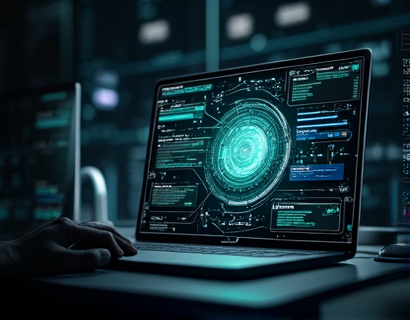Revolutionizing Productivity and App Accessibility: The Synergy of AI and Cryptocurrency
The integration of artificial intelligence (AI) and cryptocurrency is ushering in a new era of digital transformation, significantly enhancing productivity and app accessibility. This fusion of technologies is not just a trend but a fundamental shift in how we interact with digital tools and platforms. By leveraging the strengths of both AI and cryptocurrency, developers are creating next-generation solutions that redefine task management, streamline workflows, and offer unprecedented levels of efficiency and security.
AI, with its ability to process vast amounts of data and learn from patterns, is becoming an indispensable tool in optimizing digital experiences. When combined with the decentralized and secure nature of cryptocurrency, the potential for innovation is immense. This article delves into the cutting-edge digital solutions that are emerging at the intersection of AI and cryptocurrency, exploring how these technologies are transforming the way we manage tasks and access applications.
Enhancing Task Management with AI
Task management has traditionally been a cumbersome process, often requiring manual input and coordination. With AI, this process is being revolutionized. Intelligent task management systems can now predict user needs, automate routine tasks, and provide real-time insights to boost productivity. These systems use machine learning algorithms to analyze user behavior and preferences, adapting to individual work styles and optimizing task workflows.
For instance, AI-powered virtual assistants can handle everything from scheduling meetings to prioritizing emails, freeing up valuable time for more critical tasks. These assistants can integrate with various productivity tools, creating a seamless ecosystem that enhances efficiency. By automating repetitive tasks, AI ensures that users can focus on high-value activities, leading to significant improvements in overall productivity.
Streamlining Workflows with Blockchain and AI
Blockchain technology, known for its role in cryptocurrencies, offers a decentralized and transparent way to manage data and transactions. When combined with AI, blockchain can further enhance workflow management by ensuring data integrity and security. Smart contracts, self-executing contracts with the terms directly written into code, can automate complex business processes, reducing the need for intermediaries and minimizing errors.
AI can optimize the execution of these smart contracts by analyzing data in real-time and making informed decisions. For example, in supply chain management, AI can predict demand and adjust inventory levels accordingly, while blockchain ensures that all transactions are recorded transparently and securely. This synergy not only streamlines workflows but also builds trust among stakeholders.
Decentralized Applications and AI
Decentralized applications (dApps) are another area where AI and cryptocurrency are making significant strides. dApps operate on blockchain networks, offering users greater control and privacy compared to traditional centralized applications. AI enhances dApps by providing advanced functionalities such as natural language processing, image recognition, and predictive analytics.
For instance, a dApp for project management can use AI to analyze project data, identify bottlenecks, and suggest optimizations. Users can interact with the application through intuitive interfaces, while the backend leverages AI to ensure efficient and secure operations. The decentralized nature of these applications means that data is not stored in a single location, reducing the risk of data breaches and enhancing user trust.
Enhancing App Accessibility through Cryptocurrency
Accessibility is a critical aspect of digital solutions, and cryptocurrency plays a vital role in making apps more accessible to a broader audience. Traditional app monetization models often rely on centralized payment systems, which can be exclusionary and prone to fraud. Cryptocurrency offers a more inclusive and secure alternative, allowing users to transact directly without intermediaries.
By integrating cryptocurrency payment options, app developers can reduce transaction fees and increase accessibility for users in regions with limited access to traditional banking services. Moreover, the use of blockchain ensures that transactions are transparent and tamper-proof, building trust and encouraging adoption. This approach not only broadens the user base but also promotes financial inclusion.
Tokenization of Assets and Services
Tokenization, the process of converting assets or rights into tokens on a blockchain, is another innovative application of cryptocurrency in digital solutions. In the context of AI and productivity tools, tokenization can be used to create tokenized rewards for users who contribute to the ecosystem. For example, users who provide data for AI training or participate in community moderation can earn tokens that can be used to access premium features or other services within the platform.
This tokenization model incentivizes user engagement and participation, creating a more dynamic and community-driven ecosystem. It also allows for more flexible and transparent monetization strategies, as tokens can be traded or sold, providing additional revenue streams for both users and developers.
Security and Privacy in AI and Cryptocurrency Solutions
Security and privacy are paramount in the realm of AI and cryptocurrency. The combination of these technologies offers robust solutions to protect user data and ensure secure transactions. Blockchain's inherent security features, such as cryptographic hashing and decentralized consensus mechanisms, provide a strong foundation for safeguarding sensitive information.
AI can further enhance security by detecting and mitigating threats in real-time. Machine learning algorithms can analyze patterns and identify anomalies, alerting users and administrators to potential security breaches. This proactive approach to security ensures that digital solutions remain trustworthy and reliable, even as they become more complex and interconnected.
Future Prospects and Challenges
The future of productivity and app accessibility through AI and cryptocurrency is promising, but it also comes with challenges. One of the primary challenges is the need for greater user education and adoption. Many users are still unfamiliar with blockchain and cryptocurrency, which can hinder widespread adoption. Educational initiatives and user-friendly interfaces are essential to bridge this gap.
Another challenge is the regulatory landscape. As AI and cryptocurrency continue to evolve, regulatory frameworks must adapt to ensure that these technologies are used responsibly and ethically. Collaboration between technologists, policymakers, and industry stakeholders is crucial to create a balanced and supportive environment for innovation.
Despite these challenges, the potential benefits are substantial. The integration of AI and cryptocurrency has the power to transform various industries, from healthcare and finance to education and entertainment. By leveraging these technologies, we can create more efficient, secure, and inclusive digital solutions that enhance the user experience and drive meaningful change.
In conclusion, the fusion of AI and cryptocurrency is opening new frontiers in digital innovation. As we continue to explore and develop these cutting-edge solutions, the future of productivity and app accessibility looks brighter and more promising than ever. The next generation of digital tools will not only streamline workflows but also empower users with unprecedented levels of control and security.










































